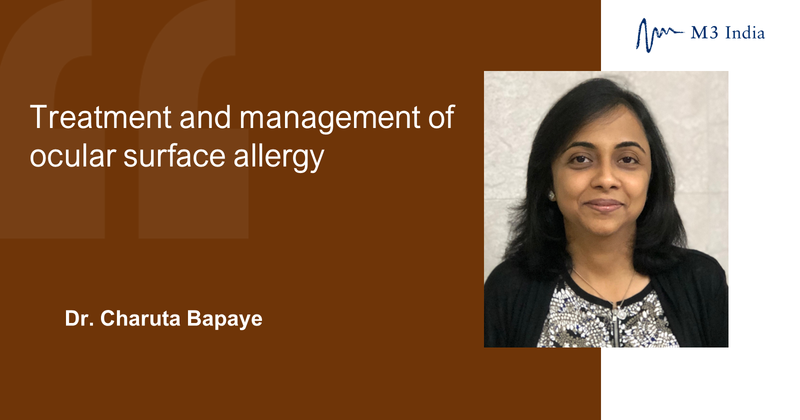Steroids or mast cell stabilisers for ocular allergy? Dr. Charuta Bapaye explains
M3 India Newsdesk Jun 16, 2019
For the Sunday Series, we bring to you an article from our archives where Dr. Charuta Bapaye, an eminent Paediatric Ophthalmologist explains when mast cell stabilisers should be chosen over steroids for treating ocular surface allergies

Ocular surface allergy is a common problem in children, especially in dry and hot weather. It can be perennial (present all year round) or seasonal. It mainly affects younger children and decreases by the age of 12 to 13. As this is a chronic problem with distressing symptoms, and no permanent solution, it is common for parents to hop from doctor to doctor in search of complete relief. Paediatric ophthalmologists, general ophthalmologists, Pediatricians, general practitioners are all consulted by stressed-out parents.
- First and foremost it is important for doctors to make parents understand that allergy is a tendency which the body has, and we cannot cure it completely. It will reduce with age, but in the meantime, it can be kept under control with medicines. As eye allergies are caused by environmental factors like temperature, dust, pollens etc, one cannot avoid the allergens completely. Normally, patients end up getting overtreated as they keep shifting from doctor to doctor, and are therefore more likely to develop side effects of the medication.
- Also, parents need to be counselled to be realistic in their expectations. The aim of treatment is not to remove every bit of redness from the eyes. It is only to make the eye comfortable, minimise itching and watering, and prevent side effects.
- Next parents need to be explained that the allergy, per se, is not visually harmful, but a few indirect complications of severe allergies can impact vision.
- Constant rubbing of eyes can cause astigmatism (cylindrical power) and a progressive weakening disease of the cornea called keratoconus
- Non-infective corneal ulcers can get secondarily infected and cause corneal scarring
Prescribing steroids
Paediatricians or general practitioners are not recommended to start steroid eye drops unless absolutely necessary. There are non-steroidal alternatives available like olopatadine (mast cell stabiliser), which can be started, along with lubricating drops and oral anti-histamines. If allergy is not responding then the patient should be referred to a specialist for monitored treatment with steroid eye drops.
If at all steroid eye drops are started, it is essential to counsel parents about their side effects after long term use, and urge them to seek help from an ophthalmologist if they do not feel better within about 15 days. Warn patients against getting drops over the counter and using them indiscriminately. Simple measures to prevent allergy can be suggested to parents which can go a long way in reducing the symptoms. Children who have the tendency should be advised to wear protective glasses or sunglasses when outdoors. Children are encouraged to wash their hands and face after playing outdoors. Pets may be avoided.
If steroids are not used sparingly as per prescription and used on and off because the patient feels good after putting them, then they can lead to steroid-induced cataract and steroid-induced glaucoma. Cataract needs to be operated, but at least vision can be restored. Glaucoma is a silent killer of vision, where the intra-ocular pressure rises and damages the optic nerve. The patient does not realise that he is losing vision initially and can even end up with irreversible blindness. So, never never use steroid eyedrops without the advise of an ophthalmologist. However, understanding the reverse is also as important, that steroids are essential to control allergy, and they do not cause side effects if used sparingly, under proper guidance and when the eye pressure is monitored.
Ocular allergy is generally not related to any food intake, so modification of diet is not necessary. Neither is it essential to curtail outdoor activities as ocular allergy is anyways self-limiting, and the benefits of outdoor activities outweigh the disadvantages. Children, however, should be advised not to play outdoors in the afternoon.
Treatment of ocular allergy
- Ocular allergy is treated by a proper course of eye drops prescribed. Usually, steroid eye drops are to be given over a period of 15 days to a month, gradually tapering the frequency.
- Steroid eye drops are accompanied by non-steroidal anti-allergics like olopatadine, epinastine, ketotifen (mast cell stabilisers), tacrolimus, cyclosporine (immunosuppressives), alcaftadine (antihistaminics), ketorolac (anti-inflammatory), which can then be continued over a longer period to prevent recurrence of symptoms.
- Lubricating eyedrops help to wash away the allergens and prevent dryness and corneal ulceration.
- In severe cases, supratarsal steroid injections can be given.
- Oral steroids and anti-allergics can also be used.
- Intraocular pressure and optic disc changes are to be monitored when the patient is on steroid treatment.
This article was originaly published on 29.01.19
Disclaimer-The information and views set out in this article are those of the author(s) and do not necessarily reflect the official opinion of M3 India. Neither M3 India nor any person acting on their behalf may be held responsible for the use which may be made of the information contained therein.
-
Exclusive Write-ups & Webinars by KOLs
-
Daily Quiz by specialty
-
Paid Market Research Surveys
-
Case discussions, News & Journals' summaries